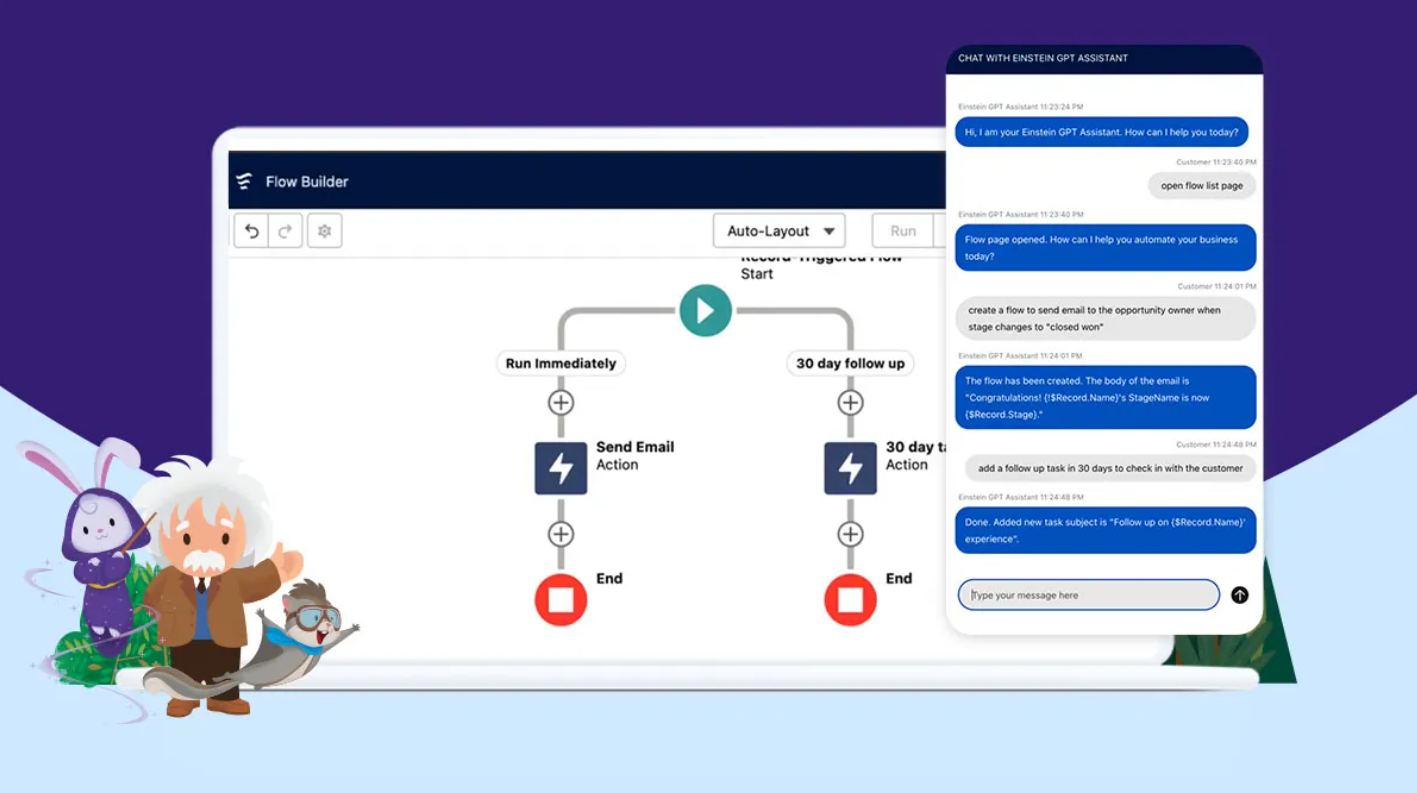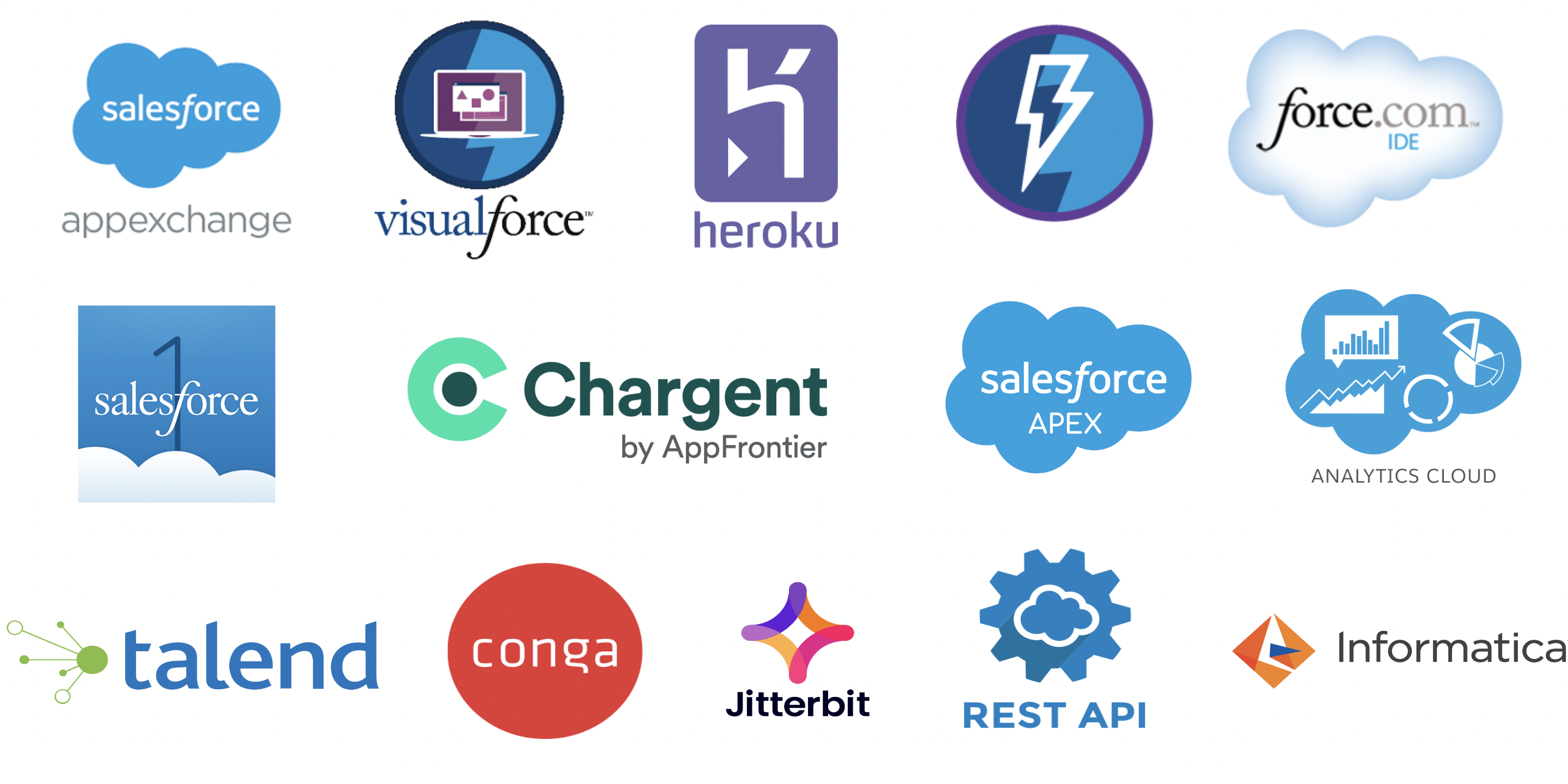6 Considerations for Hiring an AppExchange Development Partner
In the Salesforce ecosystem, AppExchange apps play a pivotal role. These apps enhance functionality, offer specialized solutions, and pave the way for increased productivity. However, developing or tweaking these products in the app marketplace is different from general Salesforce development.
Here are vital considerations when hiring AppExchange developers.
Understanding the Salesforce AppExchange Ecosystem

Salesforce AppExchange is more than just a marketplace for Salesforce apps; it’s an expansive ecosystem that has transformed how businesses find and utilize Salesforce solutions that meet their many needs.
It’s built on collaboration, innovation, and trust, ensuring businesses can find and utilize the tools they need to succeed in the ever-evolving digital landscape.
What is AppExchange?
AppExchange is Salesforce’s online marketplace for third-party applications that run on the Salesforce platform. It’s like an app store but specifically tailored for companies using Salesforce.. From sales and customer service to marketing and finance, the platform offers various tools designed to integrate seamlessly with Salesforce’s main offerings.
Who is AppExchange App Development For?
Whether you’re a small business, a non-profit, or a massive enterprise, the AppExchange ecosystem has solutions tailored for your scale and industry.
There’s something for everyone, from free starter packs to premium industry-specific solutions.
The Partner Ecosystem
Understanding the distinctions among partner categories in AppExchange is critical. All entities aiming to feature an app on AppExchange must be registered ISV (Independent Software Vendor) partners. This ISV status earmarks companies that have developed and own their AppExchange products.
On the other side of the spectrum, the AppExchange also showcases profiles for consulting partners. However, many of these consulting entities might not possess their own AppExchange apps. Instead, they bring expertise in guiding and aiding other businesses in developing and implementing these apps.
For instance, a company like KMS, while adept as a consulting partner and systems integrator with the prowess to develop AppExchange products, won’t necessarily hold the ISV designation unless we introduce our proprietary product on the platform.
In such scenarios, while KMS may not be an ISV partner, our clientele who commission and own the AppExchange products will be.
Custom Solutions
While many ready-to-use apps exist on AppExchange, the ecosystem also supports bespoke solutions. Many partners offer customization services, tailoring solutions to a business’s unique requirements.
Defining Your Goals and Objectives

- Augmenting Salesforce Capabilities: Leverage the AppExchange to incorporate functionalities not readily available in Salesforce’s native offerings. This might mean seamlessly merging tools like Docusign for electronic signatures or Conga Composer for effortless document generation directly from Salesforce data.
- Automation & Efficiency: Streamline intricate business operations to reduce manual efforts, thus eliminating the chances of human errors and boosting overall efficiency.
- Integration Mastery: Given that many AppExchange solutions interlink with external systems, aiming for seamless integration is key. For instance, while Docusign’s primary system might operate outside Salesforce, its AppExchange product ties both platforms in a cohesive manner, enhancing user experience.
- Optimal Workflow Design: Redesign and fine-tune workflows to accelerate customer service, all without escalating operational costs.
A technical consultation with KMS Tech can assist in refining these aims, helping you grasp the vast potential that custom Salesforce AppExchange products can unlock for your organization.
Considerations for Hiring an AppExchange Development Partner
When considering an AppExchange developer, it’s not about fitting into an existing mold. It’s about molding the environment to fit the unique needs of the Salesforce ecosystem.
Keep in mind the distinctions between modifying existing AppExchange products and building new ones tailored for the ecosystem.
Your AppExchange developer should clearly understand these dynamics to deliver a product that stands out and adds value to the Salesforce instance of businesses across the spectrum.
1. Identify Your Project’s Required Skills
Customizing an AppExchange product often involves several technical skills.
In addition to knowing Apex, Salesforce’s proprietary coding language, developers will probably need to use popular languages like JavaScript.
Here’s a closer look at the essential skills a competent AppExchange developer should have.
- Salesforce Platform Expertise: Any AppExchange developer should be deeply familiar with the Salesforce platform. This includes a strong grasp of Salesforce Object Query Language (SOQL), Salesforce Object Search Language (SOSL), and the nuances of custom object development.
- APEX Programming: APEX is Salesforce’s proprietary programming language, and mastery of it is non-negotiable. Developers should be adept at writing, debugging, and optimizing APEX code to build robust and efficient applications.
- Visualforce & Lightning Component Framework: A command over Visualforce pages and Lightning components is crucial for designing intuitive and responsive user interfaces within the AppExchange environment.
- Integration Capabilities: Given that many AppExchange apps will need to interface with external systems, developers should be proficient in integrating Salesforce with other platforms using REST or SOAP APIs.
- Security Protocols: AppExchange apps undergo rigorous security reviews by Salesforce. Thus, a developer must understand platform-specific security norms, including CRUD and FLS enforcement, to ensure the app is compliant and secure.
- Managed Packages: Knowledge of creating and maintaining managed packages is essential, as these are the primary means of distributing apps on AppExchange.
- Continuous Integration & Deployment (CI/CD): With the Salesforce DX toolset and other related technologies, developers should be familiar with modern CI/CD practices to streamline the development, testing, and deployment of apps.
- Testing & Quality Assurance: A strong background in unit testing, especially with Salesforce’s testing framework, ensures the app’s robustness and readiness for AppExchange’s strict review process.
- Business Process Understanding: Beyond the technical, a developer should have a keen sense of business processes. This ensures the app functions well, aligns with the business objectives, and adds tangible value to the end-users.
2. Pricing & Time to Market
In AppExchange application development, understanding the nuances of pricing and time-to-market considerations is essential for ensuring project success and maximizing return on investment (ROI).
Here’s a deeper look at why these factors matter and how they play a pivotal role in your project.
Budget Optimization
An in-depth understanding of pricing models, whether fixed-price, hourly, or milestone-based, can help you anticipate costs and manage your finances efficiently.
Value Proposition
It’s not just about the initial cost. Evaluate the long-term value an application will bring to your business. A higher initial investment might offer more features, better scalability, or enhanced user experience, leading to greater ROI in the long run.
Competitive Analysis
Understanding how your competitors are pricing similar solutions can provide insights into market expectations. It can guide your own pricing strategy when you launch your app on AppExchange.
Quality Assurance & Testing
While expedited development can hasten time to market, it should not come at the expense of quality. Ensure that ample time and budget are allocated for rigorous testing to avoid post-launch issues, which can incur additional costs and damage your brand’s reputation.
Rapid Deployment
Time to market plays a crucial role in leveraging market opportunities. Faster deployment can give you a competitive advantage, allowing you to capture market share before your competitors.
Agile Methodologies
Embracing agile development processes can streamline the development cycle, ensuring quicker iterations and more responsive changes, accelerating market delivery.
Scalable Solutions
Initial development might be quicker with a basic version of the application. However, ensure that it is scalable, allowing for easy additions and upgrades in the future without overhauling the entire system, which can save time and costs in the long run.
Third-Party Integrations
Consider the time and cost implications of integrating third-party tools or services. While they might increase the initial development cost, they can significantly reduce the time to market if they eliminate the need for building certain functionalities from scratch.
3. Industry-Specific Experience

Creating apps for the AppExchange often necessitates adherence to industry standards and governmental regulations. Since these requirements can differ widely between sectors, selecting a developer familiar with your field’s nuances is crucial.
For instance, a healthcare organization would benefit immensely from a developer well-versed in HIPAA guidelines. In the same vein, call centers would collaborate well with professionals adept at comprehending FTC rules regarding call timings and contact management.
4. Comprehensive Post-Development Support & Maintenance
A successful AppExchange application does not end at its launch.
The dynamic nature of businesses, technology, and customer needs means your application will require consistent attention post-deployment.
Here’s why comprehensive post-development support and maintenance is paramount.
Ongoing Evolution
As businesses grow and adapt, so should their applications. Post-development support ensures that the application evolves in tandem with changing business needs, keeping it relevant and valuable.
Bug Fixes
No matter how rigorous the testing, unforeseen issues can emerge in real-world usage. Prompt and effective support ensures that any bugs or issues are swiftly addressed, ensuring a seamless user experience.
Compatibility Updates
Salesforce undergoes regular updates. Post-development maintenance ensures your AppExchange application remains compatible with the latest Salesforce version, preserving its functionality and preventing potential disruptions.
Security Patches
The digital landscape is fraught with evolving security threats. Regular maintenance means timely security patches, ensuring your application remains impervious to new vulnerabilities.
Performance Optimization
As user bases grow and new features are introduced, the application’s performance can be affected. Regular maintenance ensures optimization tweaks are made to ensure consistent and swift performance.
Feedback Loop Integration
Continuous user feedback is a goldmine for improvement. Post-development support teams can prioritize and implement this feedback, resulting in a product that aligns more closely with user needs and preferences.
Training & Documentation Updates
As your application evolves, so should the training materials and documentation. Keeping them updated ensures new users and stakeholders understand the application’s full capabilities.
Regulatory Compliance
Especially crucial for industries like healthcare or finance, regulations can change. Maintenance ensures your application always complies with the latest regulatory standards.
5. Seamless Communication & Collaboration
Collaboration is the key to successful app development. It’s crucial that your AppExchange developer is flexible and can conform to your systems and communication methods. This streamlines the development process and ensures that your visions align perfectly.
6. Customer Reviews & Testimonials
Look beyond the developer’s claims. The AppExchange consultant section is a goldmine of genuine feedback. Here, you can gain insights into a developer’s performance, reliability, and more from businesses who’ve walked the path you’re considering.
Work With an Experienced Salesforce AppExchange Partner
Our development and consulting services help Salesforce customers get more out of their AppExchange listings. From understanding industry-specific regulations to ensuring post-development support, our commitment is to offer an end-to-end partnership.
With years of Salesforce consulting and development experience, our Salesforce AppExchange App Development Services combine a profound understanding of the AppExchange platform and development solutions that are technically sound and resonate with market needs.
Whether you’re interested in developing custom solutions new to the marketplace or updating an app already listed on AppExchange, the experts at KMS Technology are ready to help.










